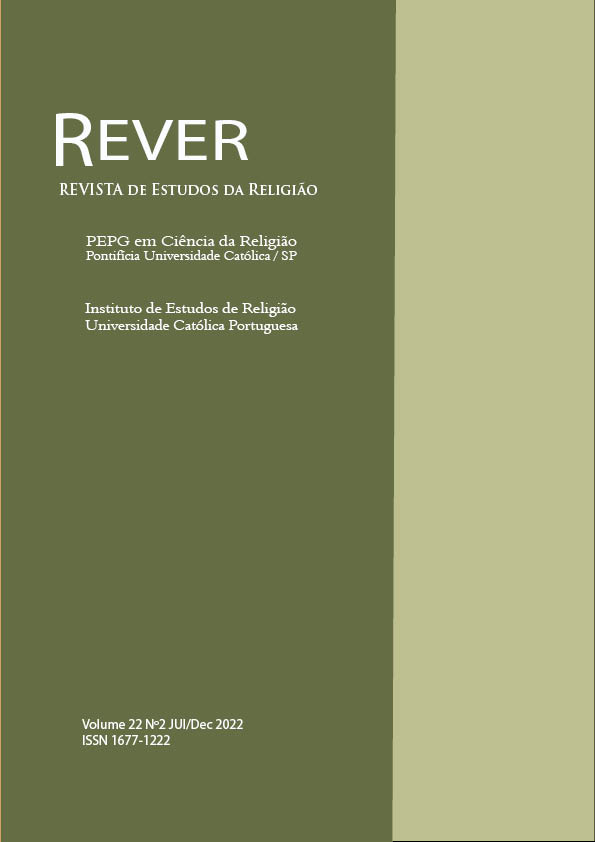Islamic psychology
An overview on theoretical models and conceptions of the human psyche
DOI:
https://doi.org/10.23925/1677-1222.2021vol22i2a11Keywords:
islamic psychology, spirituality, religiosity, islam, psychology of religionAbstract
The search for new paradigms and epistemologies that meet the demands of different ethnic-cultural groups has been a growing trend in the field of Psychology. The use of hegemonic universalizing theories that for so long dominated Science, disregarding the influence of religion and spirituality on the cognitions, emotions, and behaviors of the individual, creates the need for new epistemological proposals in order to encompass such singularities. The inclusion of religiosity/spirituality (R/S) in therapeutic practices and interventions has been encouraged by the positive results described in the literature, both in the physical and psychological spheres, inspiring the continuous expansion of knowledge in this field. This scenario opens space for the combination of different knowledge in a multidisciplinary perspective, among which Islamic psychology has stood out. This is a literature review that aims to present the bases, landmarks, and elements that contributed to some of the Islamic Psychology theoretical models, discussing the advances and challenges faced in this field of study. In view of this, it is concluded that, although religious knowledge does not offer answers to all the questions of psychological science, it adds information that can contribute to a better comprehension of the human psyche and the study of the soul. Despite being a little-explored field in current Science, Islamic psychology is an epistemology that has its roots in ancient Islamic religious and philosophical knowledge, having as the main proposal the construction of a holistic approach to the human psyche that integrates the physical, mental and spiritual dimensions.
References
ABU-RAIYA, H. Towards a systematic Quranic theory of personality. Mental Health, Religion & Culture, v. 15, n. 3, p. 217-233, 2012.
ABU-RAIYA, H.; PARGAMENT, K. I. Empirically based psychology of Islam: summary and critique of the literature. Mental Health, Religion & Culture, v. 14, n. 2, p. 93-115, 2011.
AL-KARAM, C. Y. (Ed.). Islamically Integrated Psychotherapy: uniting faith and professional practice. Pennsylvania: Templeton Press, 2018.
ASHRAAH, M. M., GMAIAN, I.; AL-SHUDAIFAT, S.. Sex education as viewed by Islam education. European Journal of Scientific Research, n. 95, v. 1, p. 5-16, 2013.
AWAAD, R.; ELSAYED, D.; ALI, S.; ABID, A. Islamic Psychology. A portrait of its historical origins and contributions. In: KESHAVARZI, H.; ALI, B. (Eds.), Introducing traditional Islamically integrated psychotherapy. New York: Routledge, 2021.
BADRI, Malik. The dilemma of muslim psychologists. Kuala Lumpur: Islamic Book Trust, 2016.
BADRI, Malik. Contemplation. An Islamic Psychospiritual Study. Trad. Abdul-Wahid L. London-Washington: IIIT, 2018.
BENSAID, B., MACHOUCHE, S.; GRINE, F. (2014). A Quranic framework for spiritual intelligence. Religions, n. 5, v. 1, p. 179-198, 2014.
EL HAYEK, Samir. (Trad.). O significado dos versículos do Alcorão Sagrado (14ª ed.). São Paulo: Marsam Editora Jornalística, 2019.
ELZAMZAMY, K.; AHMED, R. M.; HASSAN, W.; EL MAHDI, M. (2021). In: HAQUE, Amber; ROTHMAN, Abdallah (Eds.), Islamic psychology around the globe. Seattle, Washington: International Association of Islamic Psychology, 2021.
FAHEEM, S. Tawakkul: the missing peace in the journey of life. South Africa: Islamic Lifestyle Solutions, 2020.
AL-GHAZZALI. A alquimia da felicidade. Trad. DANIEL, E. J. Rio de Janeiro: Fissus, 2001.
HAQUE, Amber.; ROTHMAN, Abdallah (Eds.). Islamic psychology around the globe. Seattle, Washington: International Association of Islamic Psychology, 2021.
HAQUE, A.; KHAN, F.; KESHAVARZI, H.; ROTHMAN, A. E. Integrating Islamic traditions in modern psychology: research trends in last ten years. Journal of Muslim Mental Health, n. 10, v.1, p. 75-100, 2016.
HATHOUT, Hassan. Viagem pela mente de um muçulmano. Oak Brook: American Trust Publications, 2014.
JOSHANLOO, M. A comparison of western and Islamic conceptions of happiness. Journal of Happiness Studies: An Interdisciplinary Forum on Subjective Well-Being, n. 14, n. 6, p. 1857-1874, 2013.
KESHAVARZI, H.; ALI, B. Foundations of traditional islamically integrated psychotherapy (TIIP). In: KESHAVARZI, Hooman; KHAN, Fahad; ALI, Bilal; AWAAD, R. (Eds.), Introducing traditional Islamically integrated psychotherapy. New York: Routledge. 2021.
KESHAVARZI, H.; HAQUE, A. Outlining a psychotherapy model for enhancing Muslim mental health within an Islamic context. International. Journal Psychology of Religion, v. 23, n.3, p. 230–249, 2013.
OMAR, M. N. Ethics in Islam: a brief survey. Social Sciences, v. 8, n. 5, 387-392, 2013.
OTHMAN, N. A preface to the Islamic personality psychology. International Journal of Psychological Studies, v. 8, n. 1, p. 20-27, 2016.
PASHA-ZAIDI, N. Indigenizing an Islamic psychology. Psychology of Religion and Spirituality, v. 13, n. 2, p. 194-203, 2021.
RASOOL, Hussein. Islamic psychology: human behaviour and experience from an Islamic perspective. London: Routledge, 2021.
ROTHMAN, Abdallah. Developing a model of Islamic psychology and psychotherapy: Islamic theology and contemporary understandings of Psychology. London: Routledge, 2022.
ROTHMAN, A.; COYLE, A. Toward a framework for Islamic psychology and psychotherapy: an Islamic model of the soul. Journal of Religion and Health, v. 57, n. 5, p. 1731-1744, 2018.
SAHIH AL-BUKHARI, S. Good manners and form (Al-Adab). <https://sunnah.com/bukhari:6114>. Acesso em: 13 fev. 2022.
SKINNER, R. An Islamic approach to psychology and mental health. Mental Health, Religion & Culture, v. 13, n. 6, p. 547-551, 2010.
SKINNER, R. Traditions, Paradigms and Basic Concepts in Islamic Psychology. J Relig Health v. 58, p. 1087–1094, 2019.
SUNAN IBN MAJAH. The chapters on marriage. Recuperado de
<https://sunnah.com/ibnmajah:1977>. Acesso em: 13 fev. 2022.
TABBARAH, Afif A. The spirit of Islam: doctrine and teachings (H. T. Shoucair, Trad.). Beirut: Dar el-Ilm Lil-Malayin, 2001.
YASIEN, Mohamed. Fitra: The Islamic concept of human nature. London: Taha Publishers, 1996.
Downloads
Published
How to Cite
Issue
Section
License

This work is licensed under a Creative Commons Attribution-NonCommercial 4.0 International License.
Authors who publish in this journal agree with the following terms:- Authors retain copyright, but grant the journal the right of first publication, with the work simultaneously licensed under the Creative Commons BY-NC License.
- Authors are authorized to assume additional contracts separately, for non-exclusive distribution of the work published in this journal (e.g., publishing in an institutional repository or as a book chapter), as long as with acknowledgment of authorship and first publication in this journal.


